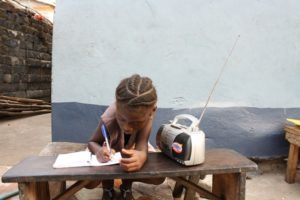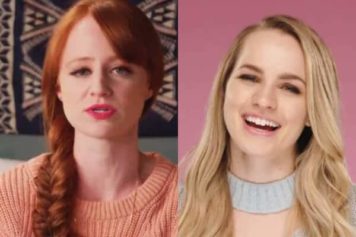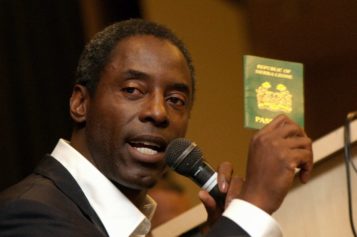Every day, 17-year-old Kaday goes to school by turning on the radio.
She’s one of the million school-age children in Sierra Leone who’ve had no classroom to go to since July. That’s when the government closed all schools to curb the spread of Ebola.
But that doesn’t mean the kids have stopped learning. In October, the government launched a radio education program, partnering with UNICEF and several development organizations. Teachers write and record hourlong lessons that are broadcast on 41 government radio stations, as well as the country’s only TV channel. Younger children listen in the morning; older ones tune in during the afternoon and evening.
“This is to ensure that children’s rights to education is not disrupted even when schools have been closed,” says Wongani Grace Taulo, UNICEF’s education chief in Sierra Leone. “It’s been more than half a year of school closure. The implications can be devastating when children just stay home [and] lose out on their academic gains.”
UNICEF’s partner organizations visit around 2,000 households of school-age children each week to see how many children are listening. At first, fewer than 20 percent were tuned in. Gradually the numbers picked up. At its peak, more than 70 percent of students were listening. The average rate, Taulo says, is about 50 percent.
The radio lessons could be critical in a country where the decade-long civil war had weakened the education system even before Ebola struck. Fewer than 45 percent of adults are literate, and the secondary school attendance rate among adolescent boys and girls is 40 and 33 percent, respectively. The Ebola outbreak has threatened to reverse any progress Sierra Leone and its neighbors Guinea and Liberia have made in rebuilding its schools.
When schools finally reopen in Sierra Leone, Taulo adds, the radio program will be adjusted to serve as a complement — rather than an alternative — to classrooms.
But school by radio isn’t a perfect solution.
Radio is by far the most common way Sierra Leoneans get their information, with studies estimating that between 70 and 90 percent of the population tune in daily. But the number of people who actually own a radio is only about 25 percent, the country’s education minister told Agence France-Presse.
And that’s a “generous estimate,” says Chernor Bah, a girl’s rights advocate from Sierra Leone. He’s been helping make sure the radio program reaches as many underserved children as possible.
Read more at NPR



